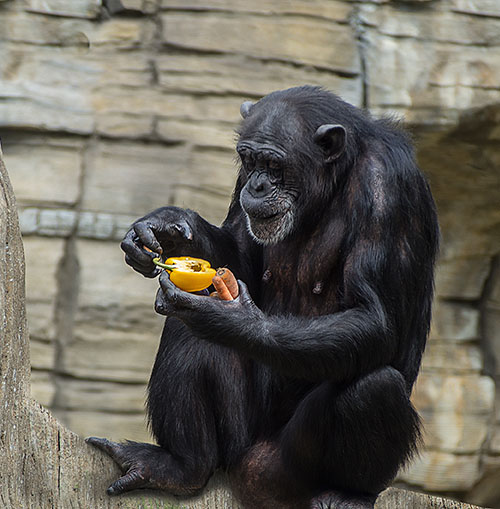 Culture & Ethics
Culture & Ethics
 Evolution
Evolution
 Human Origins
Human Origins
Chimps Can Cook! — Or Not
We are continually told: “Humans are not exceptional!” Scientists and advocates huff and puff to show how animals are just like us, and the media eats it up.
This one made me laugh. The other day, the Guardian ran an article with a title that declared chimpanzees can cook. The title, however, ended up being a bit misleading:
A study found that chimpanzees prefer the taste of cooked food, can defer gratification while waiting for it and even choose to hoard raw vegetables if they know they will have the chance to cook them later on.
The findings suggest that our earliest ancestors may have developed a taste for roast vegetables and grilled meat earlier than previously thought, potentially shifting the timeline for one of the critical transitions in human history.
Wow! So, given the chance, they cook? Well, not exactly. They just exchanged raw food for better tasting cooked food:
For safety reasons, this was a plastic lunchbox with a false bottom, which researchers used to “transform” raw sweet potato placed inside by the chimpanzees into a cooked slice of a similar size…
Overall, the apes chose cooked potato nearly 90% of the time when they were given a straight choice and they were nearly as keen when they had to wait one minute while it was “cooked” by the researcher (who shook the plastic box ten times).
The chimps continued to opt for the cooked option 60% of the time when they had to carry the food some distance in order to place it in the “oven” — although since they often carried it in their mouths this was a challenge and they sometimes appeared to eat the food on the way, “almost by accident”.
So, chimps don’t cook. Nor is there any evidence they have ever tried. They reacted to an unnatural situation set up by humans. But, of course, this means chimps are people too, or perhaps better stated, we are just chimps:
Dr. Erica van de Waal, a psychologist at the University of St Andrews, said the findings add to the growing list of parallels that have been observed between human and ape behaviours. “The more we study our primate cousins, the more we realise that they have the bases of most of our cognitive abilities, including for language, culture and fairness,” she said.
Other than the fact that they don’t have the actual abilities.
The experiments were performed at the Jane Goodall Institute’s Tchimpounga Chimpanzee Sanctuary, which may shed some light on the results. Goodall is an ideologue as much as a scientist and exaggerated the inner lives of the chimps she observed to make them seem more human.
Cross-posted at Human Exceptionalism.
Image: � meisterx / Dollar Photo Club.

